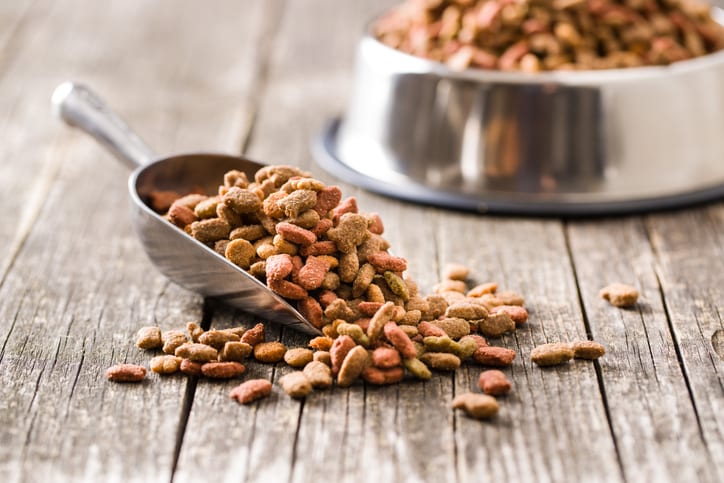There are a lot of possible reasons to consider a diet change, but perhaps even more important than the diet itself, is the transition from one diet to another. It’s also important to consider when the transition should take place- there are some circumstances where a diet change could be detrimental.
Why Change Your Dog’s Food in Granger, IN?
There are a variety of reasons pet owners change their dog’s food- from diet fads, to belief that their dogs might be bored with their diet; as well as necessary diet changes because a food no longer exists, or the dog’s nutritional needs change.
Diet Fads
There will forever be conflicting recommendations about diet types for humans and animals alike. It seems that every half year some new “expert” emerges with a novel feeding plan that is supposed to be more natural, or biologically appropriate, or ideal for longevity, or mimicking the consumer’s genetic history. One of those trends is to change diets frequently, sometimes called a rotational diet. At this time there is no proven benefit to rotating- Some people think it reduces the risk of developing food allergies but in truth it can complicate diagnosis if food allergy is present. If you choose to follow a rotational diet plan, it is always safest to transition gradually from one bag to another.
Boredom
Some owners are concerned that their pet will grow bored of their dog food over time, and thus they need to “mix it up” on occasion. The truth is dogs don’t have the same emotional attachment to food that we as humans do and so variety is not a requirement or expectation. If you find your dog seems “bored” with the diet you’re providing, it’s possible there is an underlying cause and so a visit to the veterinarian should be your first move, ahead of switching their dog food.
Their Dog Food Doesn’t Exist Anymore
It’s no secret that dog food companies are constantly updating formulas, eliminating long-run diets, and adding new ones. They also change packaging appearance and add new ingredients as they see fit. If you’ve found that your pet’s diet has changed, it’s a good idea to consider a gradual transition.
Their Nutritional Needs Change
Switching dog food is strongly recommended at each life stage transition- from puppy to adulthood and even from adulthood to the senior years. But Nutritional requirements can also change with specific conditions. Food allergies are obvious- if your dog is allergic to an ingredient in their diet a change is in order. But some other diseases require nutritional adjustments, like diabetes (increased protein, increased fiber, reduced simple carbohydrates), pancreatitis (reduced fat, moderate protein intake, increased carbohydrates), or kidney disease (reduced protein, restricted phosphorus). These diet changes should be guided by your veterinarian.
When to Switch Your Dog’s Food in Granger, IN
The timing of a switching dog food should be carefully considered. For healthy dogs who are transitioning between life stage formulas or starting a new formula in replacement of an old one, you can execute the transition at any time that works for you.
If your dog has any current medical concerns you should absolutely check with your veterinarian before changing the diet. If your dog is exhibiting any gastrointestinal symptoms like vomiting or diarrhea, you should avoid a diet change until those symptoms are resolved or your veterinarian gives you explicit instructions to change. Changing the diet during illness, disease or any adverse symptoms can complicate matters to your pet’s detriment.
How to Change Your Dog’s Food
A slow transition is essential to any diet change, to keep your pet happy, healthy, and comfortable, and to keep your floors and carpets free of vomit and diarrhea. Sudden dog food changes can cause major disruptions in intestinal flora, leading to inflammation, nausea, diarrhea, and sometimes vomiting. These intestinal flora disruptions can lead to difficult-to-manage conditions like dysbiosis (overgrowth of potentially pathogenic bacteria) or acute hemorrhagic diarrhea syndrome (sudden onset of bloody diarrhea).
How a Dog Food Transition Works
Ideally a dog food transition should happen over at least a ten to fourteen-day period. Each day of the transition, slightly less of the original diet is fed, and slightly more of the new diet is fed. If gastrointestinal upset is observed at any time, the transition should be halted or backed off slightly, and the transition should proceed more slowly until complete.
How to Choose a Dog Food in Granger, IN
When choosing a dog food and changing diets for your pet, it’s important to consider their needs before chasing down popular trends. A solid rule of thumb to follow, is to avoid changing diets if what your pet is eating works for them. Most dogs will tolerate eating the same diet nearly every day of their entire adult life, so changes aren’t necessary.
If your pet is at an ideal weight, doesn’t vomit, and eats well, a diet change isn’t necessary. If your dog has normal, well-formed stools that are not too loose or too hard, that’s a very clear indication that your pet is digesting the diet well and gleaning all possible nutrients. Under these circumstances, changing your pet’s diet is largely unnecessary unless there is some other health condition that warrants it.
Recent Posts
About Us
Welcome to Kryder & Harr Veterinary Clinic! Our animal hospital has been a fixture in the Granger community since 1981, practicing full-service veterinary medicine for all our pet parents and their furry family members. At KHVC, we pride ourselves on our history, of providing excellent customer service for our clients, along with dedicated, compassionate, and exceptional medical care for all of our patients.

